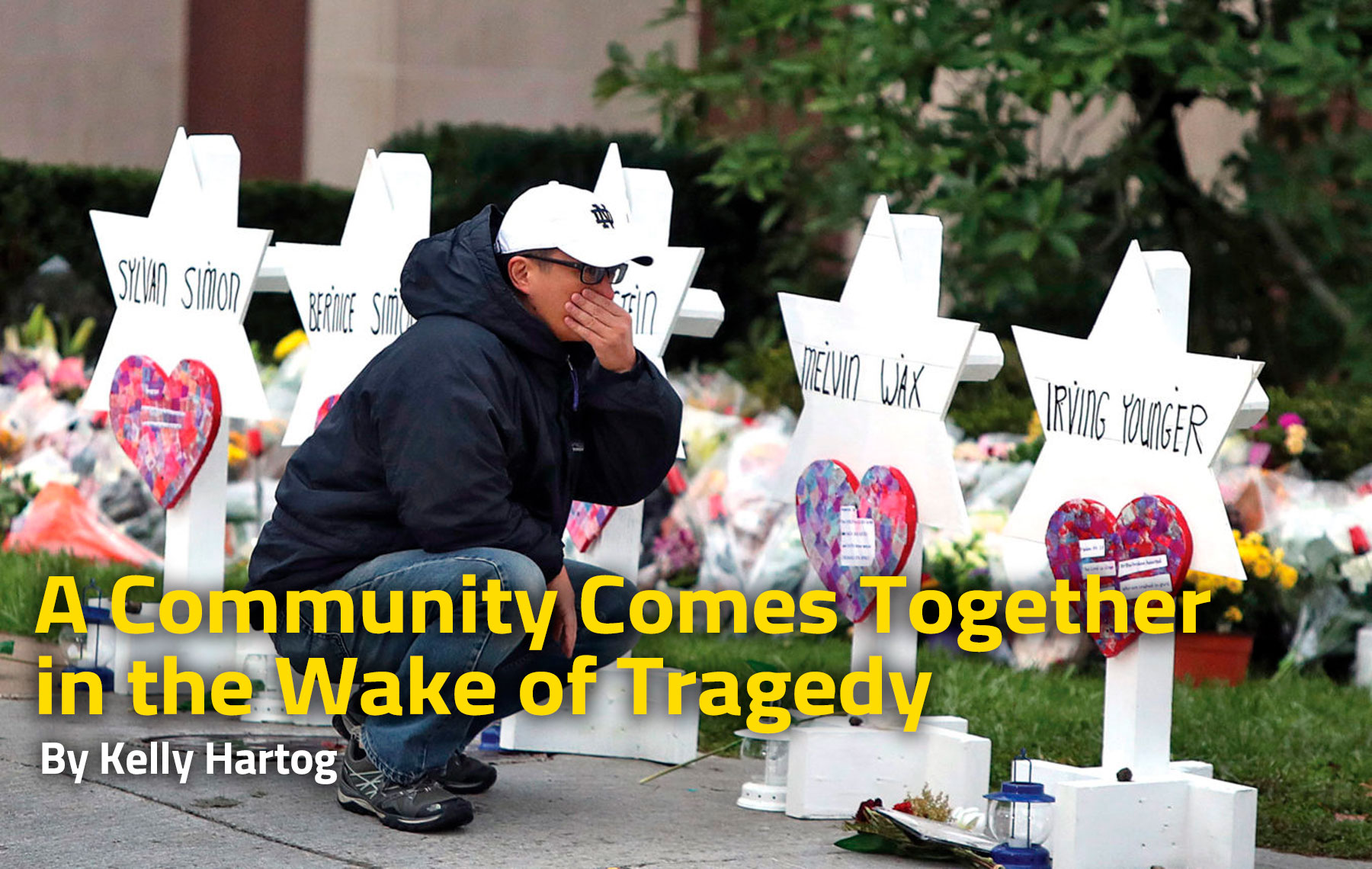
https://www.facebook.com/JewishJournal/videos/1704660019663515/
Eitz chayim hi lamachazikim bah… It is a tree of life for those who cling to it.
On the night of Sunday, Oct. 28, less than 36 hours after a gunman rampaged through the Tree of Life Congregation synagogue in Pittsburgh’s Squirrel Hill, mowing down 11 Jewish souls, close to 3,000 people braved driving rain, howling winds and 40-degree temperatures to take part in an interfaith vigil honoring the dead.
They converged en masse at Soldiers & Sailors Memorial Hall — an imperious brick structure squatting high above the University of Pittsburgh in the city’s Oakland neighborhood. They packed the hall to its rafters, lined its hallways, and even stood outside in the darkness, huddled under umbrellas, listening to loudspeakers of the rousing speeches inside.
When Tree of Life’s Rabbi Jeffrey Myers stepped to the microphone, the crowd fell silent, clinging to his words.
You probably recognize Myers by now from his cable news appearances, your social media feeds, his powerful speech at the vigil, and the iconic photograph of him escaping from the synagogue on that Shabbat morning, wrapped in his tallit, accompanied by police.
Thirty minutes after the vigil, on the Memorial Hall’s cold, dark steps, when most attendees had left, Myers stood cloaked in his long, dark coat, his black kippah —bearing the gold letter ‘P’ of the Pittsburgh Pirates — clipped tightly to his shock of white hair. He stood seemingly strong and tall — a tree of life for those who cling to it.
Here was a soft-spoken man — upon closer look with red-rimmed eyes — somehow upholding the Squirrel Hill community in the glare of international television crews; a man who had no time to grieve, to process, to mourn, to even begin to deal with the immense trauma he was suffering.
And yet, he remained gracious and thoughtful, his roots in the Squirrel Hill community giving strength to his words, his compassion, his resilience — in spite of the chilling knowledge that, according to the anti-Defamation League, he and his community had suffered the deadliest anti-Semitic attack in American history.
The beauty, strength and resilience of Pittsburgh is palpable in the leafy Squirrel Hill neighborhood, with its brick and wood two-story homes and their welcoming front porches set back along wide streets surrounded by verdant parkways.
“The Squirrel Hill Jewish community is an unusual community in that it has been based here for a very long time. There are three day schools. The synagogues here range from Reform to Lubavitch, within walking distance, all within the eruv.” — Lynn Berman
You could see and feel it at the intersection of Wilkins and Murray avenues, down the hill from Tree of Life, where a perimeter was set up early Monday morning by police who expected the crime scene investigation to continue for at least a week.
Realizing they could no longer drive up a hill to the synagogue entrance, where 11 makeshift Star of David memorial tributes stood, people quickly set up a second, makeshift memorial of flowers, candles and heartfelt prayers, including a sign in Hebrew that read “mitpalel” (praying). There was a bouquet of flowers with a rosary wrapped around it, a sign reading “Hate has no home here” in half a dozen languages, and expressions of love and support were written into the sidewalk, thanks to someone who thoughtfully left a box of chalk.
Jen and Mark Montinola, a young, Catholic couple, drove here from their home 30 minutes away to lay a delicately wrapped bouquet of red roses and read a prayer they had written themselves.
“It was such a huge tragedy for our entire city,” Jen said. “That it could happen here gave us such a helpless feeling. We wanted to do something to show our support.”
“We’re Catholic,” Mark added, “but we have friends of many different faiths and we wanted to come and say a prayer.”
It was here where a woman in her 60s placed her own bouquet. She then turned, walked up to me, and without a word hugged me. Wrapped in her warm embrace against the buffeting winds, I whispered, “I don’t live here, I’m just a journalist here to write a story.”
“It doesn’t matter,” she said. “We all need a hug right now.”
It was here that Nikki Malzi came with her 18-month-old Goldendoodle, Tucker, to pay her respects. She spoke of how she and her husband went to donate blood after a call went out on Saturday, but the centers were overwhelmed with donors. “We went back on Sunday to donate,” she said. “They told us that on Saturday, when they usually close at 2:30 p.m., they stayed till 9 p.m.” to accommodate everyone who had shown up.
It was here where Mandi Babkis, who grew up in Squirrel Hill and now lives just 10 minutes away, said, “Even though I didn’t personally know those who died, even though it wasn’t my synagogue, I just felt, intuitively, empathically, I needed to stop here today.”
The ripples of community support widened as I trudged toward the synagogue’s entrance. The locals kindly offered directions. A compassionate police officer, stationed in his car to block passage up one of the side streets, took pity: “Sure,” he said, “you can take the shortcut. Stay on the right-hand side of the street and tell the police officer at the top that I let you pass.”
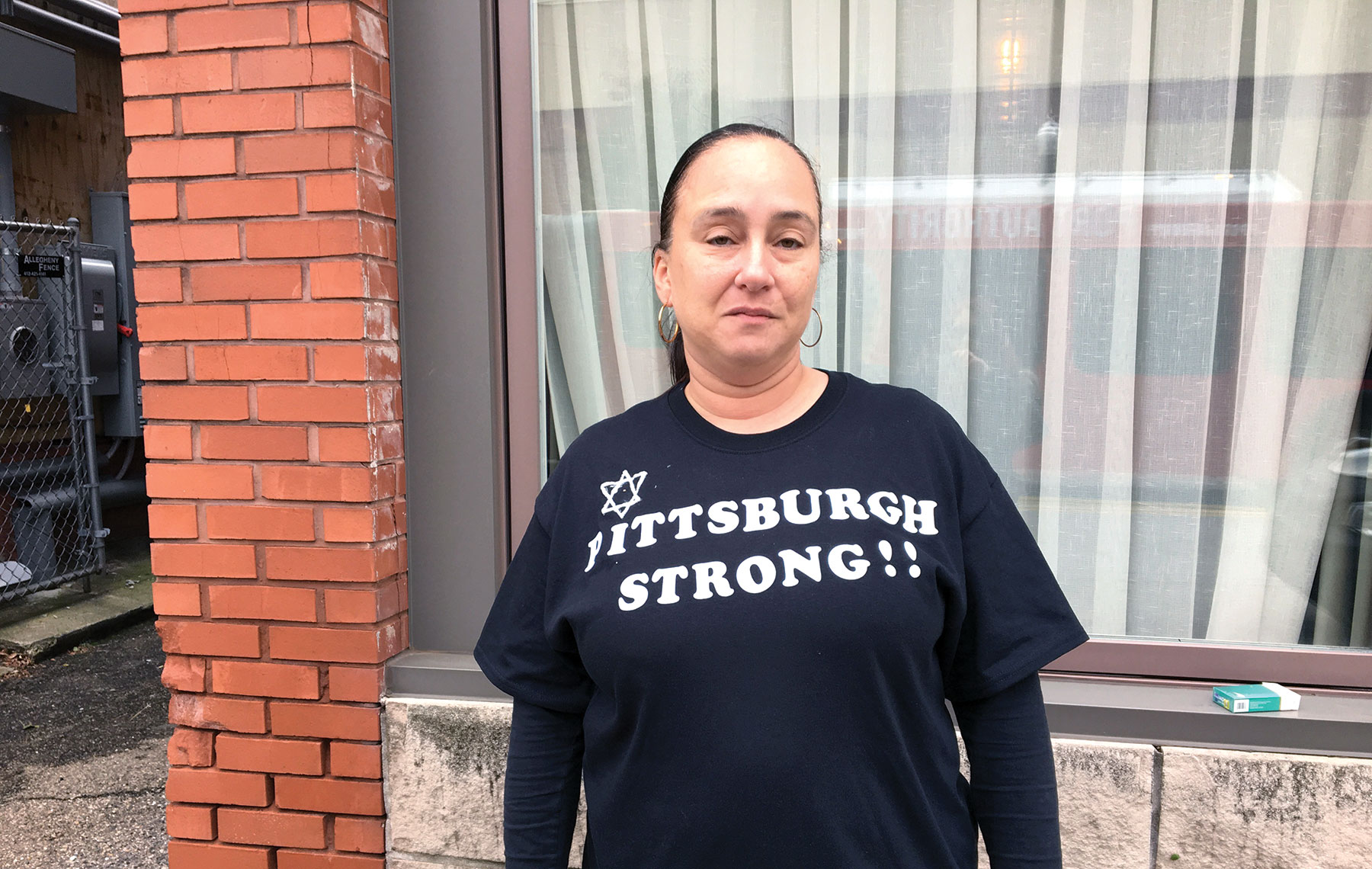
With willingness, grace and humility, Squirrel Hill’s residents let the mass of news media representatives into their lives, when nobody would blame them for wanting to shut us out. Nowhere was this willingness more palpable than on the long stretch of Murray Avenue lined with Jewish stores and restaurants.
There, I ran into a woman smoking a cigarette, dressed in black scrubs and a black T-shirt emblazoned with “Pittsburgh Strong” in bold, white letters — and a white, hand-drawn Star of David. She said her name was Lisa Jawula, a dental assistant to a local Jewish dentist. On Sunday she went to a Michael’s craft store to buy the supplies to make the shirt.
“I felt I wanted to do something,” she said, adding that she knew the two brothers who were killed, David and Cecil Rosenthal. “They were a part of the community. Our hearts are very heavy right now,” she said. “We’re trying to get through the day as usual, but it’s hard.”
Everyone here is traumatized. Everyone has a story to tell, and everyone is standing tall and praising the beauty and love of their community – a community where everybody either knew one or more people who were killed or knew of them.
“The Squirrel Hill Jewish community is an unusual community in that it has been based here for a very long time,” said Lynn Berman. “There are three day schools. The synagogues here range from Reform to Lubavitch, within walking distance, all within the eruv.”
“We all know each other,” she said. “I could walk into any synagogue on a Shabbat morning and I would know people. Even though there are three congregations in the [Tree of Life] building, it is literally my community. Close friends had a bat mitzvah there last week.”
The four-person team of psychologists, psychiatrists, social workers and EMTs flew to Pittsburgh from Israel on the same night of the shooting.
Suzi Neft lives in Swisshelm Park but grew up in Squirrel Hill. She said in a phone interview, “The Jewish community is so close. Rabbis from extreme Orthodox to Reconstructionist all get along and everybody pulls for everybody else. We care about each other and we welcome new people all the time.”
Like many in the Orthodox community who are Sabbath observant, Berman wasn’t really aware of what was going on initially. “I live five blocks from the synagogue,” she said, “and the number of ambulances that went by our house was really quite terrifying. Then we saw the bomb squad and ATF (Alcohol, Tobacco and Firearms personnel). My husband and I were speechless. This isn’t the kind of place where you expect this to happen.”
The Bermans only found out what was going on because they have a code with their children — if the phone rings twice in quick succession on Shabbat, they know it’s an emergency and they should pick up. Those two back-to-back calls came from the Bermans’ son who lives in Cleveland, who told them when they answered the phone that their daughter, who lives in Tel Aviv, had called him to let him know what had happened.
Jamie Beth Schindler and her family drove four hours from Lancaster, Pa., to attend the funerals of her distant cousins, the Rosenthal brothers. Schindler grew up in nearby Stanton Heights, but her grandmother was the assistant to the rabbi at Tree of Life until she retired in the 1980s.
Schindler’s aunt, 68-year-old Jo Ellen Smith, still lives in Squirrel Hill and survived the 1970 Kent State shootings where four unarmed students were killed by the Ohio National Guard.
“Squirrel Hill is a very special place, but my sense is also that Squirrel Hill has become a very dangerous place,” Schindler said, adding, “I’m horrified but not surprised” by the shooting.
Smith described in a phone interview how stunned she was by the shooting. “I live two blocks from the synagogue. My mother was the secretary to the rabbi and my daughter went to religious school and had her bat mitzvah at Tree of Life.”
But for Smith, a psychologist, the helicopters overhead in the aftermath of the shooting were the hardest thing for her to bear, prompting reminders of her experiences at Kent State. She found comfort in turning on her police scanner on the computer as the attack was unfolding.
“There were some very difficult things to hear,” she said, “but it was also comforting to know how finely tuned and how highly trained and how dedicated these first responders are. They’re not just SWAT teams — there are medical SWAT people that go in with them. That made me feel even more safe.”
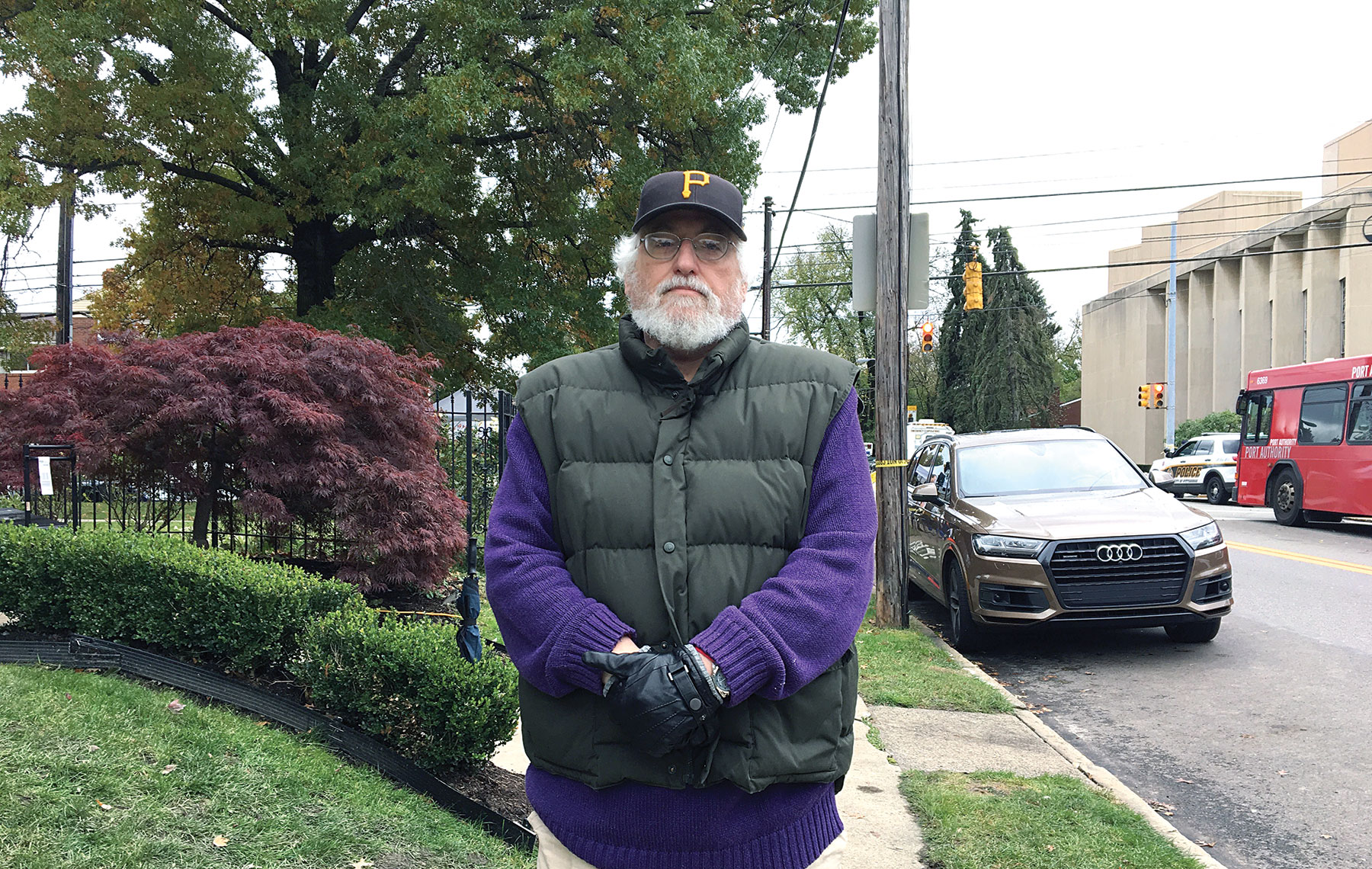
Richard Greenberg, known to all as the Squirrel Hills Kilt Man (because, yes, he wears a kilt, sports Elton John glasses, walks with a cane and smokes a cigar), was outside Tree of Life on the Monday morning after the shooting, paying his respects. He sounded incredulous as he said, “I can’t believe this happened in my own town.” He spoke of the Rosenthals — Cecil, 59, and David, 54 — both developmentally disabled. Cecil greeted everyone. David took the Torah out of the ark every week. He pointed to a marker placed for another victim, Joyce Feinberg. “After we davened Shacharis, she’d put out the breakfast. She had a heart of gold.” He also fondly remembered Dr. Jerry Rabinowitz, known for his colorful bow-ties and his work with people with HIV/AIDS in the early days of the epidemic. “I was just with him on Thursday for Shacharis,” he said, shaking his head.
As the day wore on, gray, overcast and drizzling, the phalanx of media trucks continued to swell, FBI teams walked the synagogue’s perimeter, and people kept coming to place flowers and notes and pay their respects. Elderly men and women in walkers, a small child — one hand clutching a bouquet of flowers, the other holding firmly to a parent. Adults openly sobbed.
Weaving his way through it all while simultaneously juggling media interviews was former Tree of Life Rabbi Chuck Diamond. Tall, with a head of white curls poking out from his Pirates baseball cap, he walked up to every single person — even those he didn’t know — and thanked them for coming out. He hugged two women who were openly weeping.
“We just hope to be able to give everybody the ability to come out of this OK.” — Miriam Ballin, United Hatzalah Israel
Asked what would come next after the media have moved on to the next tragedy, Diamond sighed. “The next part is the funerals,” he said. “We’re involved in the mourning and the grieving and the comforting of the community over the shiva period.
“I think it becomes especially difficult for the families after the shiva period,” he continued. “How do we go on with our lives with this heaviness? All the [victims]were wonderful people, great souls who wouldn’t hurt a fly, who just wanted to come and pray and study.”
It’s that notion of how to grieve, for both the families and the entire community, that has brought United Hatzalah Israel to Squirrel Hill.
Cari Immerman, regional director of United Hatzalah Israel, jumped into action to bring out the world’s first psycho-trauma unit. “We disperse people around the world to get on the scene and deal with psychological first aid and emotional wounds,” she said.
The four-person team of psychologists, psychiatrists, social workers and EMTs flew to Pittsburgh from Israel on the same night of the shooting. “Unfortunately, we know this drill too well in Israel, so we basically brought our expertise and said ‘use us,’” Immerman said.
Leading the team is Miriam Ballin. “We have a unique skill set that we developed in Israel based on psychological first-aid from the World Health Organization, as well as psychological first-aid developed in Israel as a result of the constant trauma that we experience. And we’ve brought those tools to the community here,” she said.
In the immediate aftermath of the shooting, Ballin said, “The surprise factor here was something that definitely caught people off guard, and it’s making the traumatic experience even all the more difficult to deal with. We just hope to be able to give everybody the ability to come out of this OK.”
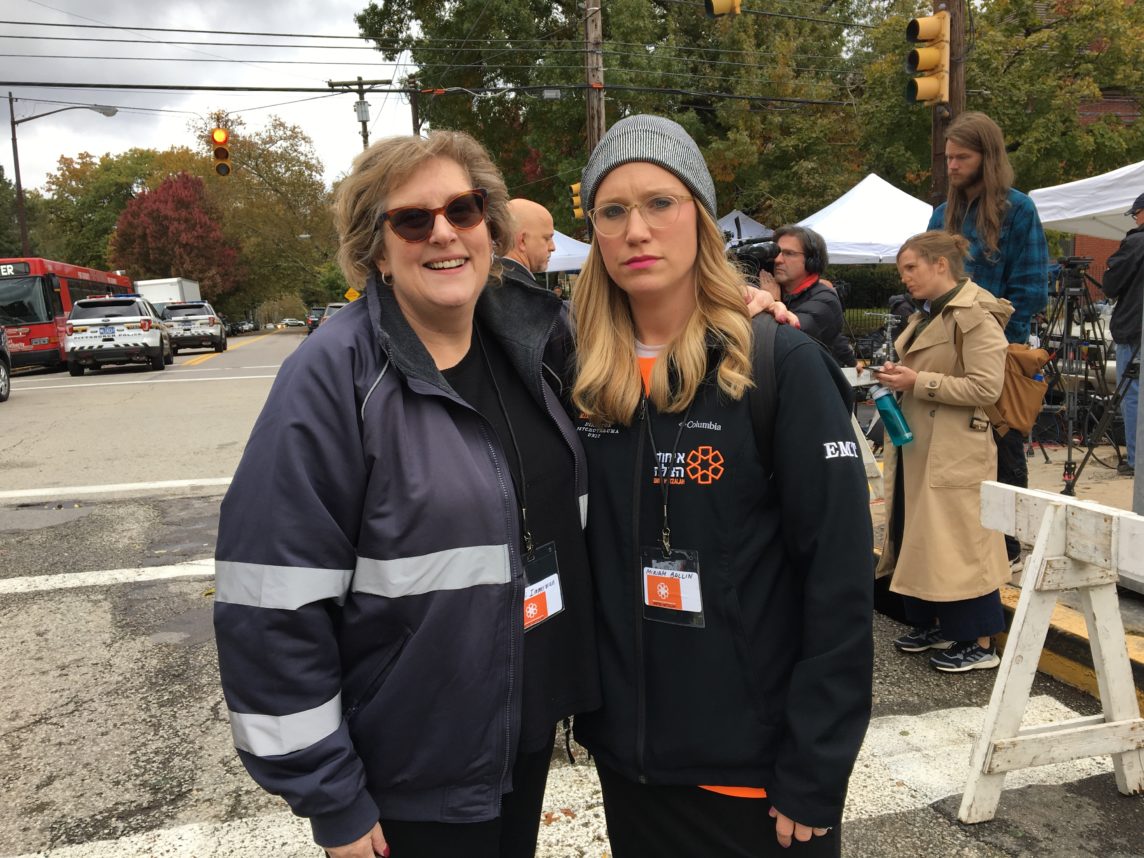
Also undertaking extraordinarily difficult work were the local Chevra Kadisha volunteers who sat with the bodies of the victims until the authorities allowed them to be released for burial. Once the FBI allowed the bodies out of the synagogue, they were taken to the medical examiner’s offices, where the volunteers stayed with the bodies.
One of those volunteers was Nina Butler. She has worked as a “shomeret” before, but said this was different because “the whole community is raw. Being a shomeret was something that filled my heart. I felt this was something constructive I could do.”
She also had nothing but praise for the police who “bent over backwards to accommodate our religious rights and customs.”
It was easy to become traumatized just standing all day outside the Tree of Life synagogue, listening to people’s stories, so I headed back to Murray Avenue and made my way to the Milky Way, a kosher, vegetarian restaurant. However, I was waylaid by Michael Milch, sitting outside the Murray Avenue Kosher supermarket drinking a cup of coffee and schmoozing with the locals. An Orthodox man, he said he only heard what was going on from what people were saying in the streets that Shabbat morning until he visited the house of a friend who had the television on.
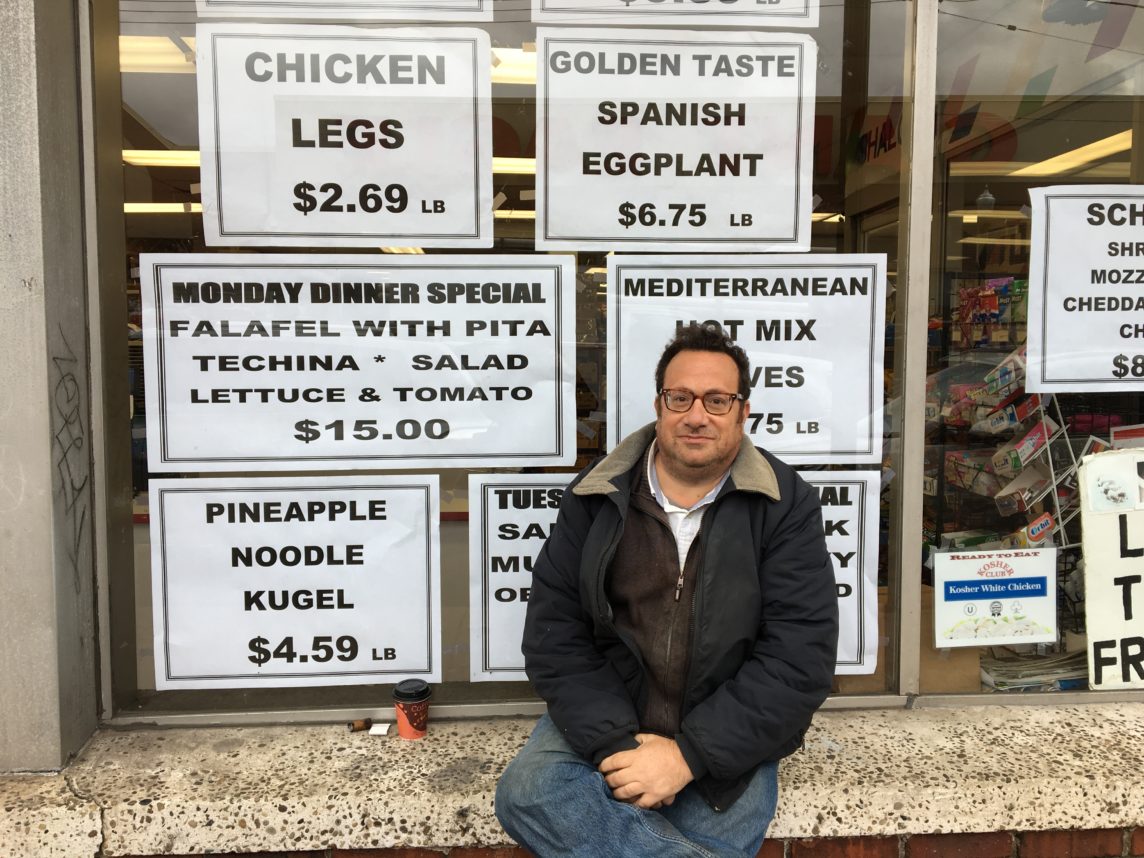
He interrupted his own story to point out a man walking down the street. “That’s our city councilman, Corey O’Connor,” Milch said. “You should talk to him.” Milch then proceeded to introduce me and said, “[O’Connor’s] dad was the mayor and lived in Squirrel Hill, and I’m sure he’s looking down on us today because he loved the Jewish community.”

O’Connor smiled and joked, “Michael’s my press secretary.” He went on to say, “It’s been remarkable how many people have come out in support of their neighborhood and their loved ones that we lost. There has been overwhelming support for the community from all of Pittsburgh. Squirrel Hill is a close-knit community and we’re going to be there for everybody. If somebody needs a helping hand, they know who to call and that’s what we’re here for. That’s why I’ve been in the district the last two days just walking the streets.”
And there it was again. That term, “close-knit,” the talk of community pulling together, of Orthodox Jews heading to the houses of not-so-frum Jews to watch a collective tragedy unfold on TV.
Nowhere was this sense of all branches of the Jewish community coming together more visible than in the Milky Way restaurant.
A middle-aged woman dressed in jeans and a pastel-striped sweater comes in to collect three heavy trays of food. Her face is taut, her skin pale. Suddenly, an Orthodox woman in a long, black skirt gets up from her lunch table, walks over to the woman and wraps her arms around her. The two of them just stand there, locked in an embrace that is so intimate, so deeply felt, I feel like an intruder as I watch. No words are spoken. When they finally pull apart, tears are in both their eyes.
Harry Ash, a 70-year-old psychologist who has lived in Squirrel Hill his whole life, is also eating his lunch of vegetarian chicken nuggets and fries at the Milky Way. He’s trying to find a way of balancing how “normal” life seems. “I went to the dentist this morning,” he said, “and here I am eating lunch. Life goes on. But [the shooting] was quite shocking. I’m still in shock.”
While Ash is Orthodox and attends Poale Zedek, where he said the rabbi informed them during services there was an active shooter at Tree of Life, he said, “I have driven by that synagogue countless times.”
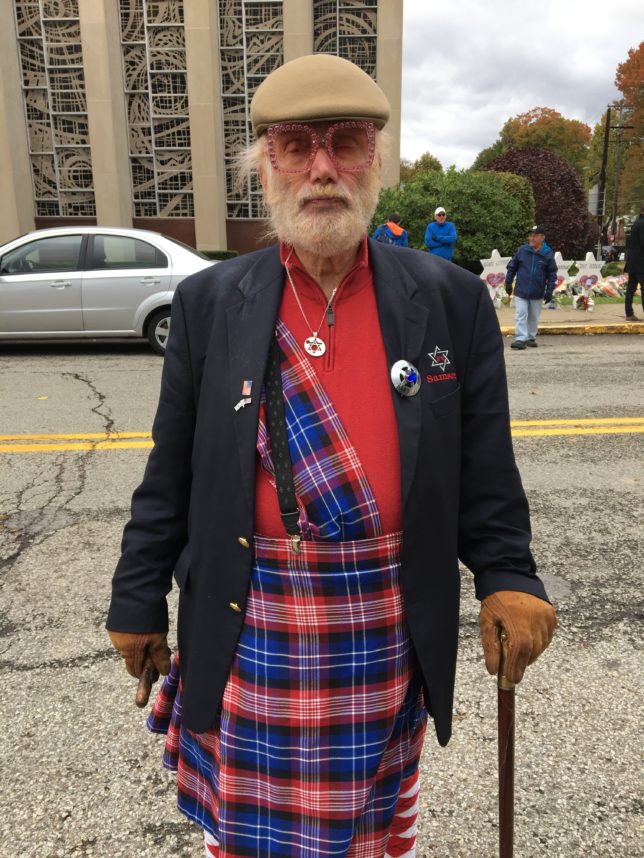
Ash said the whole incident has made him think about possibly getting a gun. But after talking about how several police officers were still shot when they had guns and years of training, he said the idea, “is just in the thinking stages.”
He also spoke of what a “beautiful community” Squirrel Hill is and how the tragedy “pushes us to appreciate what’s important in life,” adding he was surprised that several of his current and former patients — who aren’t Jewish — called to check up on him after the shooting. “I was really touched by that,” he said.
While many residents said they have been overwhelmed by the outpouring of love of the Jewish community from around the country and the world, they also went out of their way to talk about the support being provided by people of so many different faiths.
One of the most powerful speeches at the Sunday night vigil at the Soldiers & Sailors Memorial Hall came from Wasi Mohamed, executive director of the Islamic Center of Pittsburgh, where his community had already raised $70,000 to help pay funeral and medical expenses for the victims. A couple of days later, that amount had jumped to almost $150,000.
Realizing they could no longer drive up a hill to the synagogue entrance, where 11 makeshift Star of David memorial tributes stood, people quickly set up a second, makeshift memorial of flowers, candles and heartfelt prayers.
Mohamed said the Muslim community would offer whatever help was needed and “if it’s people outside your next service protecting you, let us know. We’ll be there.”
Modern Orthodox Jewish community member Barb Feige, deputy director of the American Civil Liberties Union of Pennsylvania, has worked with the Muslim community and Mohamed. She posted a thank you to him on her Facebook page that went viral.
“It’s had over 20,000 shares,” she said in a phone interview. “The ACLU did a lot of work providing safeguards to the Muslim community post 9/11when the FBI was calling people in for interviews,” she said. “Once I saw [Mohamed] was going to be at the vigil, I knew it was going to be something heartfelt. The offers of protection struck me and everybody. [I thought], ‘Oh my God, 10 minutes ago you were the ones needing protecting.’ ”
Once again, her words spoke to the bonds in this community. “I think it goes to people wanting to see good and wanting to hear good,” Feige said. “And from two groups where the rest of the world thinks we’re at each other’s throats all the time, yet here we are together.”
Berman, who also attended the vigil, spoke of seeing “Sikhs, Muslims, people wearing crosses and Catholic collars. It felt warm and supportive.”
Feige concurred. “It was healing to be together. It was that sense of needing to hear some words that we were thinking but having somebody else saying them out loud. To know that other people were going through the same thing.”
The vigil on that Sunday night, and another impromptu vigil held the night before, helped carve out a path to move the community forward. On the following Tuesday, the funerals began.
The Rosenthal brothers’ funerals were held at Rodef Shalom in Squirrel Hill, the only synagogue large enough to hold the almost 1,000 people who turned out — and even then it was standing-room only. There were audible sobs as members of the local fire department walked by the brothers’ side-by-side coffins to salute them.
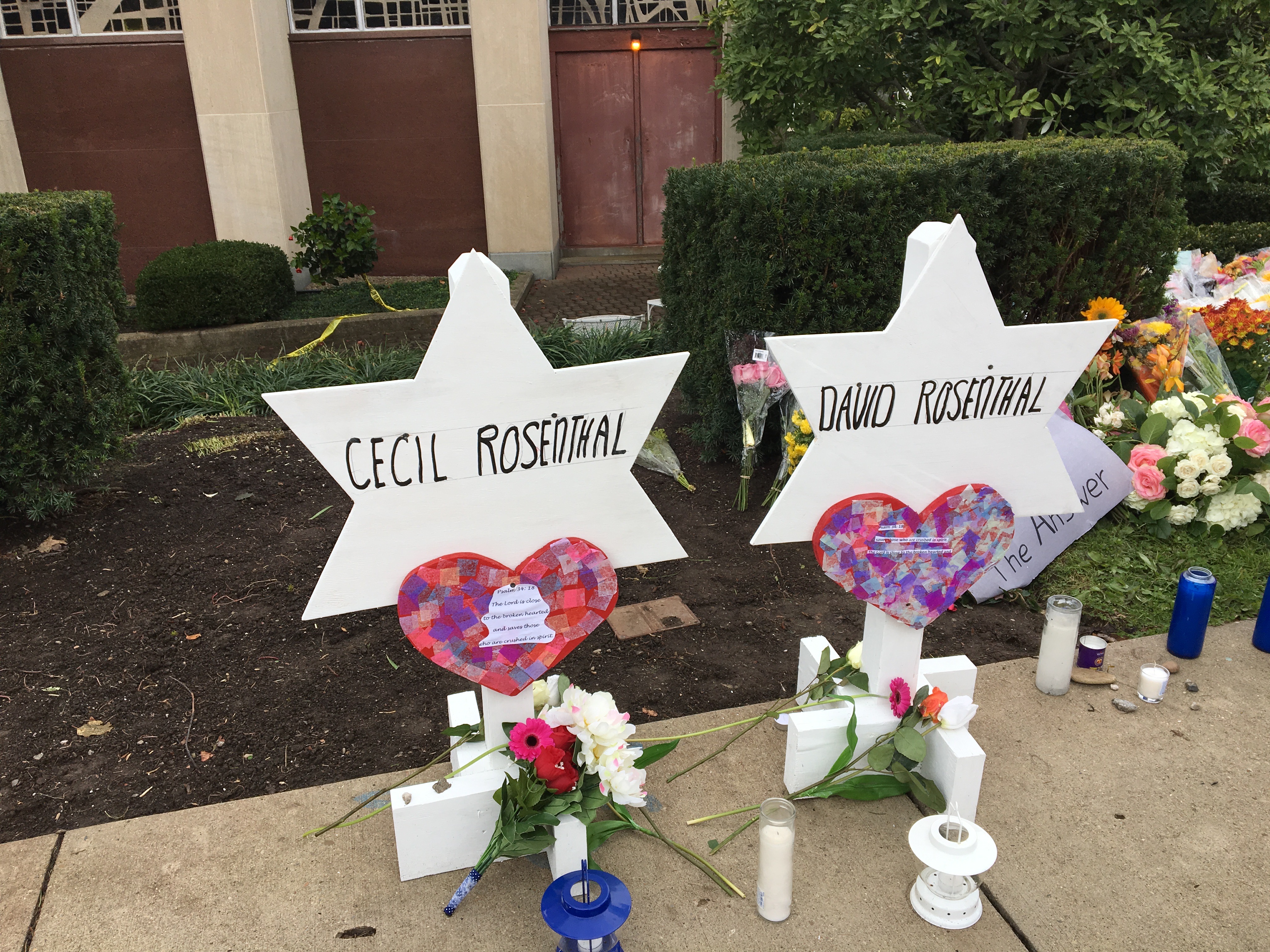
One of David and Cecil’s sister’s, Diane Rosenthal, spoke of them being men but “as most people here in the audience know, we referred to them as ‘the boys’ — maybe because they were innocent, like boys.”
She went on to say that “Even if you didn’t know them, you’ve heard stories about them on TV or in the newspapers, which” — she said to raucous laughter — “as many of you know, Cecil would have loved.”
Indeed, Diane’s husband, Michael Hirt, went to pains to talk about the differences between the two. David was the ladies man who would ask every woman if they were married, followed by “Wanna go to Hawaii?”
“If David hadn’t been handicapped, I think he would have been a movie star or a celebrity who maintained a fine balance between public and private life,” Hirt said.
He spoke of Cecil being a consummate politician, planner, organizer and socialite. He knew everyone in town and everyone’s business. “If you wanted local news gossip, Cecil was your source,” Hirt said. “If Cecil had not been handicapped, he would have been the mayor of Squirrel Hill.”
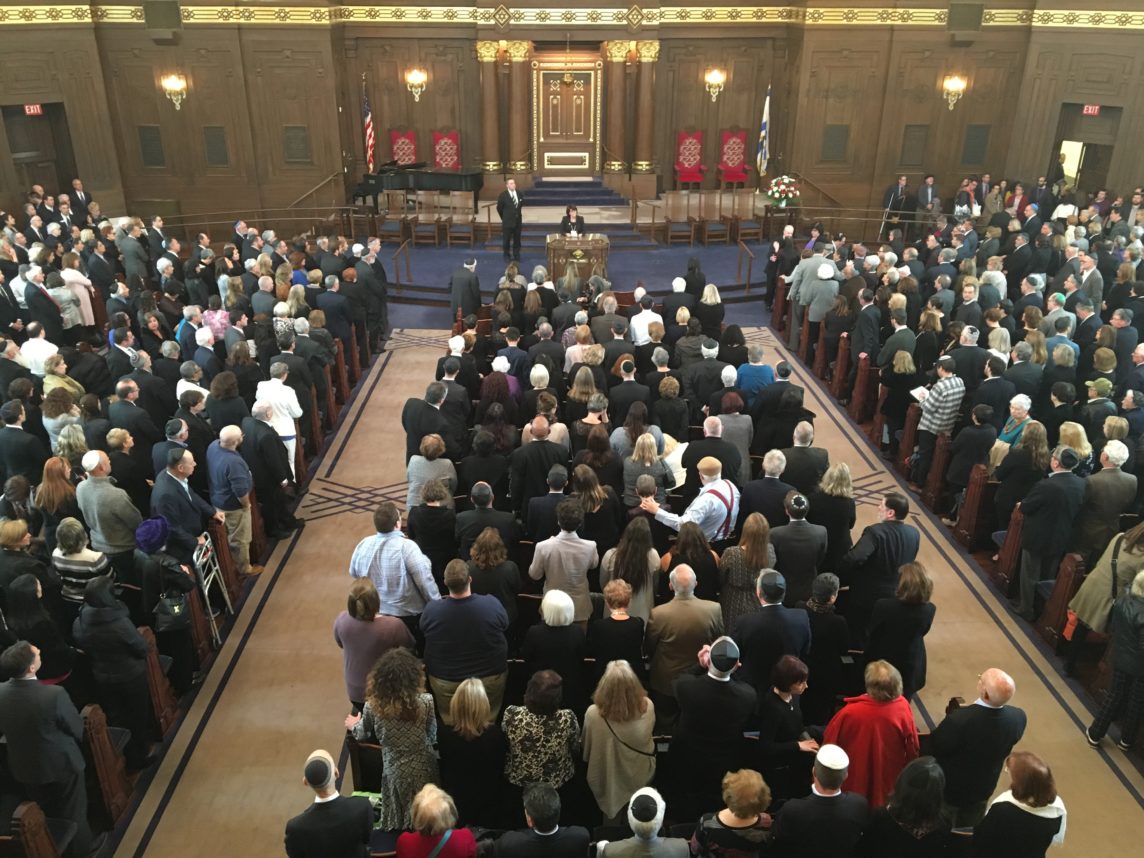
Outside, as congregants poured into their cars to follow a police escort to the cemetery, Mayor Bill Peduto, who has been in the news speaking about not wishing to meet President Donald Trump who arrived in town on Tuesday, took time to talk to some of the mourners.
“We’ll get through this,” he said. “We’ll take care of the families and make sure that the pain that they have is minimized as much as it can be.”
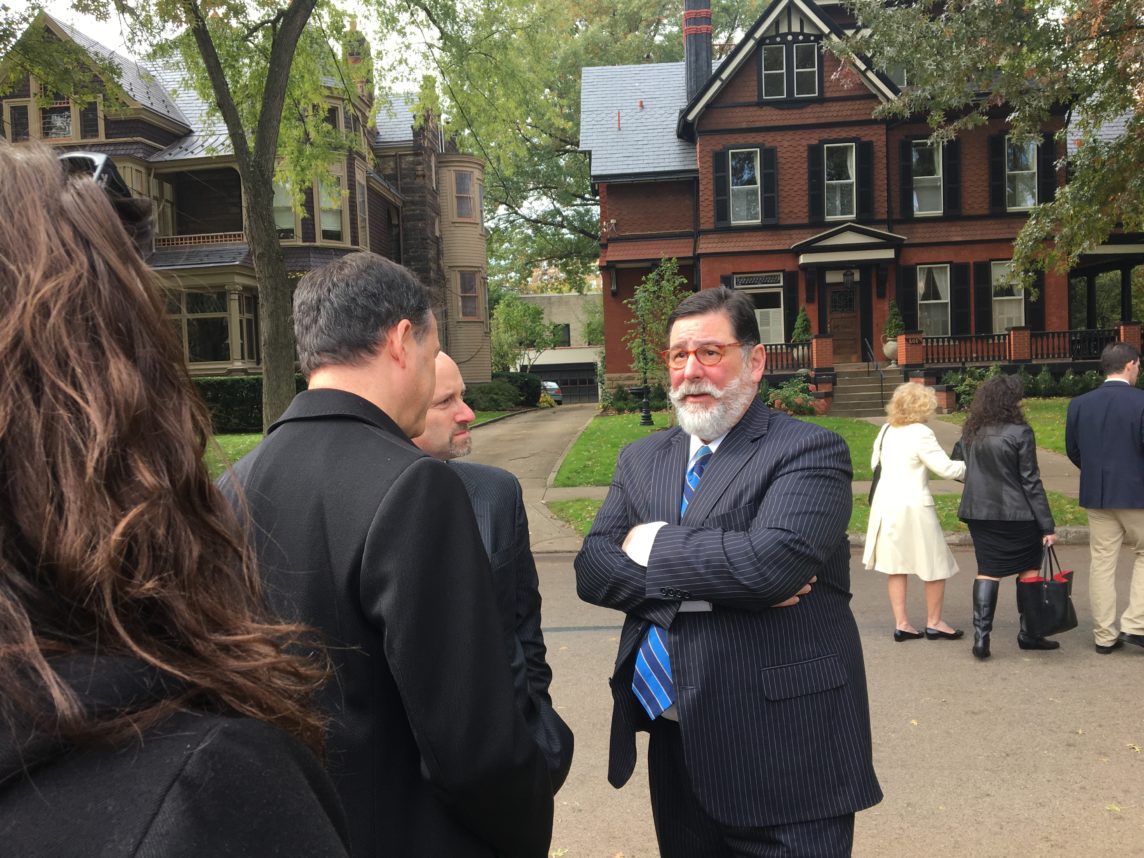
While politics has swirled around this latest tragedy, many in this community want to keep that discussion at bay — at least for now. The focus is on healing, and the community is a portrait in resilience.
Mohamed said the Muslim community would offer whatever help was needed and ‘if it’s people outside your next service protecting you, let us know. We’ll be there.’
Rabbi Diamond said that while the loss of all 11 people would be felt, “when I speak of them, sometimes I smile because this is a celebration of their lives. We will be inspired by them as we move into the future, in how they would have reacted to something like this — being there for other people. We have to be there for each other, support each other and take it a step at a time.”
“Overall, we will remain united,” Berman said. “There is no place in our community for hate.”
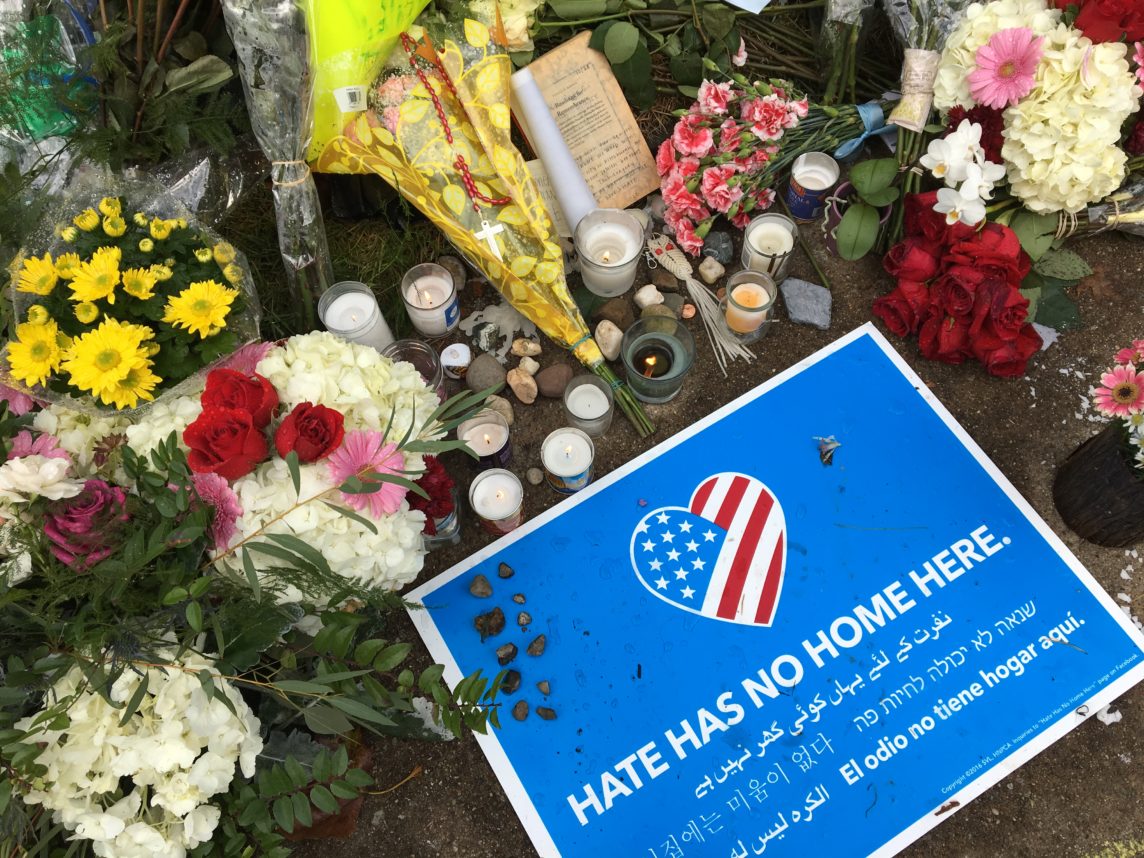
Feige said, “We don’t know yet what change this will bring. What happens with the Tree of Life building? How do you go back in there? Change will come but we don’t yet know how or what that is.
“But whatever comes next,” she added, “in Squirrel Hill in particular, the Jewish community is very close-knit. We get along because we’re on top of each other and we’re on top of each other because we get along.”
Hashiveinu adonai elecha v’nashuva, chadesh yamenu kekedem… Return us to you, God, so that we shall return, renew our days as of old.
READ MORE ON PITTSBURGH SHOOTING: Community Reactions to Pittsburgh Shooting; Tree of Life Victims: Devout, Respected, Loved;
Los Angeles Holds Vigil for Pittsburgh
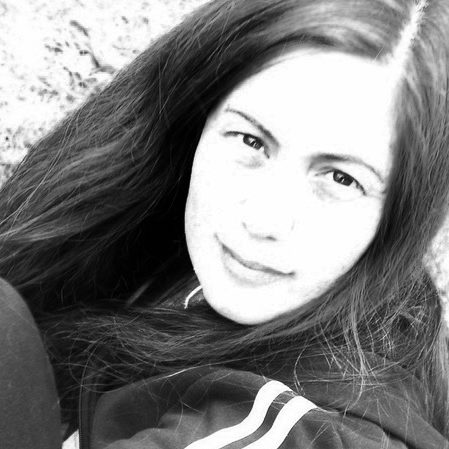






















 More news and opinions than at a Shabbat dinner, right in your inbox.
More news and opinions than at a Shabbat dinner, right in your inbox.